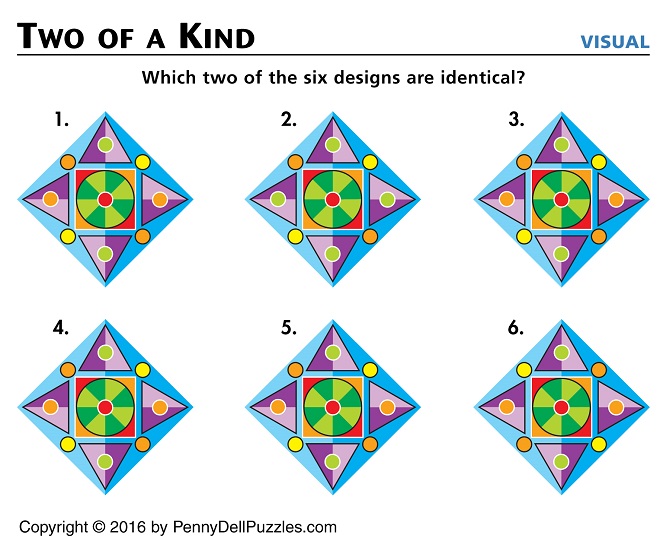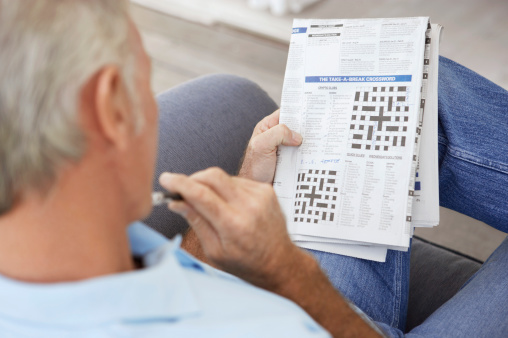Many people fear a loss of thinking skills and memory as they age. But there are steps you can take to help keep your brain sharp — from taking a brisk walk, to learning a new language, to solving a puzzle.
Just like the rest of the body, the brain changes as you age. For example, blood flow may decrease, the brain can shrink, and there may be less communication between nerve cells. This can cause even a healthy adult to sometimes forget a word or a name, and it can make multitasking harder. But the good news is that research shows the brain remains “plastic” as you age, meaning that it’s still “able to adapt to new challenges and tasks,” according to the National Institute on Aging.
So, you may have some control over how well your brain ages. To help keep yours in top shape, consider adding these seven brain boosters to your routine:
1. Improve Your Overall Health
Good general health supports a healthy brain, according to Harvard Medical School. Make sure to make regular appointments with your doctor for wellness checks. With the help of your physician, keep your blood pressure, blood sugar, and cholesterol levels in check. If you have a problem in any of these areas, your doctor can recommend lifestyle changes or prescribe medications.

Also keep a handle on your stress levels. Start with some simple yoga exercises that you can do any time you have a few minutes free. While your body reacts to an emotional upset in the same way it would to a physical threat, yoga can help encourage mindfulness, which expands your awareness of your body, thoughts, and emotions, as well as the world around you.
2. Exercise Your Body to Build Your Brain
The brain decreases in size by about 5% every 10 years after age 40. Exercise can help stave off some of those changes. A 2017 review of studies on exercise and the brain found that aerobic exercise helped to maintain volume in the left region of the hippocampus, a part of the brain that plays a role in long-term memory and spatial navigation. In other words, it can help you remember anything from the color of your childhood home to the best route to the hardware store.

The study found that people who did two to five sessions per week of cycling on a stationary bike, running on a treadmill, or walking were able to slow the reduction in brain size. This led researchers to declare exercise “a maintenance program for the brain.” In fact, exercise even lowers the risk for Alzheimer’s and vascular dementia.
Simple hacks like creating a schedule, joining a fitness community, and switching up your workout can help to make workouts a regular and enjoyable part of your life.
3. Embrace Brain Health With a Good Sleep
A 2017 study on sleep and the brain published in the journal Neurology linked a shortage of deep REM sleep to the development of dementia, including Alzheimer’s disease. REM sleep, a phase in which your eyes move rapidly and you dream intensely, typically first happens about 70 to 90 minutes after you fall asleep. Study participants who developed dementia took longer to get into REM sleep and spent an average of 17% of sleep in that phase. In contrast, the people who didn’t develop dementia spent about 20% of the time in REM sleep.

The good news is that you can learn how to sleep better. If you have sleep issues, start by asking your doctor about sleep disorders common in older adults. These include sleep apnea, insomnia, and restless leg syndrome. If you don’t have a sleep disorder, getting a better night’s rest might be as simple as adjusting the temperature and lighting in your bedroom, turning off electronics an hour before bed, and sticking to a sleep schedule.
4. Tease Your Brain With Fun and Games
Keeping your brain in shape can be a lot of fun if you add brain teasers, crossword puzzles, and word scrambles to your daily routine.
The next time you find yourself surfing the web, take a few minutes to solve an online brain teaser.
One study published in 2017 in The International Journal of Neuropsychopharmacology found that a computerized brain game improved memory in patients with a type of mild cognitive impairment. In the study, 42 patients played a “novel memory game” on an iPad. In the game, players earned gold coins by matching geometric shapes with geographic locations. Not only did memory improve, but participants enjoyed the game and were motivated to continue playing.
5. Focus on Food to Boost Brain Strength
The food you eat also has an impact on mental function and memory. Some studies have linked cognitive decline to deficiencies in vitamins such as B12, folate, and vitamin D. It’s smart to discuss testing and supplementation with your doctor.

Barring any specific deficiencies that need to be addressed, general good nutrition may improve your brain health, according to the Academy of Nutrition and Dietetics. Fortunately, the foods that are good for cognitive function also can boost heart health. Consider eating more leafy greens and other cruciferous vegetables like broccoli, along with berries, cherries, and walnuts. Also make sure you’re getting plenty of omega-3 fatty acids, the Academy recommends. Good sources include algae and fatty fish such as bluefin tuna, herring, salmon, and sardines.
6. Grow Connections With a New Language
If you’ve ever thought of dusting off your high school Spanish, learning to say hello in 50 languages, or picking up basic Japanese for an upcoming trip, now might be a great time to start. It turns out that languages not only connect people and cultures, but also they connect parts of the brain.

In a study on language and the brain at Penn State University, published in the Journal of Neurolinguistics, scientists scanned the brains of 39 native English speakers learning Chinese vocabulary. They found that just six weeks of language learning created new connections in the brain. Researchers concluded: “Learning a new language can help lead to more graceful aging.”
Not sure where to start? Try a language app such as Duolingo, which can be as effective a taking a college language class. If languages aren’t your thing, don’t worry. Any mentally stimulating activity can help boost cognitive health. So, take a class, learn a new skill, or read a book.
7. Build Your Social Network
Research shows that strong social networks may help to keep your brain healthy. In fact, one study on social networks and brain health found that larger social networks may be associated with a lower risk of dementia. If you’ve already got a close family and a big group of friends in place, that’s excellent news. If not, take small steps to reach out and build connections with others.
While it’s true that the brain does age — just like the rest of the body — taking these proactive steps will go a long way toward keeping your mind strong, healthy, and sharp.
Let’s get started! Test your brain by matching these two of a kind diamonds.

Click here for the answer:
Match is 3 and 4.







Numbers 3 and 4 are the two that are the same.
I started with looking at the colors of the circles.
I have been examinating out a few of your articles and i can state pretty nice stuff. I will make sure to bookmark your site.
I really like brain teasers..Thanks need more
Glad you enjoy them! Here are more brain teasers.
Very enjoyable and a nice visual challenge. More, please!
Marty,
Check out our brain teaser page for more!
You made some nice points there. I looked on the internet for the subject and found most people will consent with your site.
Just want to say your article is as surprising. The clearness on your publish is just cool and that i could think you are a professional in this subject. Fine together with your permission allow me to grasp your RSS feed to stay updated with drawing close post. Thanks 1,000,000 and please carry on the enjoyable work.
That was a bit harder but loved it!
I found the matching designs without a problem.
Got the right answer. Are there more challenges?
Enjoyed this challenge, and I got it!
Are you sure the identicals aren’t 1, 3, and 4?
nice articles, keep puzzles please
Thank you for the helpful feedback Clara!
The rotational position of the pinwheel in #1 is different.
Thanks Mike lol
Well done. Always something new or a little more refined to learn about.
Nice articles, please keep them coming.
Thank you, Ron!
Too small for my 75 year old eyes to see. Please allow enlarging at least a little!!
loved the visual puzzle. Needless to say I got the right answer.
isn’t one the same ?
It took me a minute but I got it. I like to partake in Sudoku. I find it a good brain exercise.
ItTook some time but I got it right.
I find Sudoku, Crossword Puzzles, playing Scrabble, Backgammon and Playing cardsards with my partner plus physically and consistently working out all quite helpful, especially during this difficult time of confinement due to the Virus that we are suffering through.
To Bob Connelly re #1 on April 25th: It’s the green “fan blades” in the center. They are rotated so that the dark green starts at “noon” instead of the light green. I missed it too. I said 3 and 5 because I didn’t notice that 5 was the only one where the dark purple was in a different place.
Good puzzle!
I enjoyed the 2 of a kind…..and fortunately got the answer correctly. Thank you.
My grandmother did crossword puzzles daily and kept up with the stock market. Her mind was entirely clear until she died. She was almost 104. That is something I have always remembered. It is especially important now. I feel my mind “wander” while confined to my home. I got a book of 500 word jumbles which helps focus my mind.
This was fun and interesting!
Could not find how #1 was different
me too I see number 1,3,4 are identical
ok I just saw it number 1 the wheel inside is different from 3 &4 after I made a comment . . yes it is 3&4 matching identical
More puzzles please!
Got it also!
I love to walk, work puzzles, adult coloring and play computer games.
I pray that all help my brain!
Thanks for sharing, Joan!
So….The Mayo Clinic agrees that WE need to be more engaged….Holistic Healthy living is a Good Thing…! Thanks, Bob N.
Interesting, I will look for additional games on your website. I enjoy games like this. Such games can be fun, challenging and addictive.
Milwaukee, WI
Started my day off with a fun exercise for my brain. Love this kind of challenge.
Got it but was harder than I expected. Love a challenge!
I need the more brain power!
Was afraid I’d fail. But yay… I got it!! On to the next one.
This is fun!
Thanks, took a few minutes but my aging brain got it! A challenge (and a relief)!
4 &5 I could not find the answer.
Hi Skeeter – Thanks for trying our brain teaser. Click on the yellow “view answer” button underneath the brain teaser. Good luck!